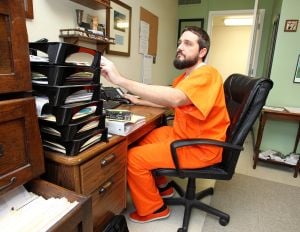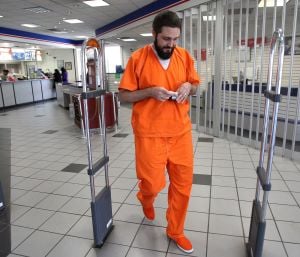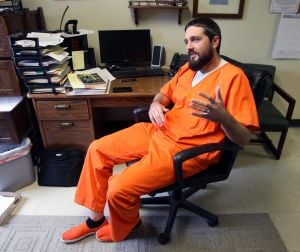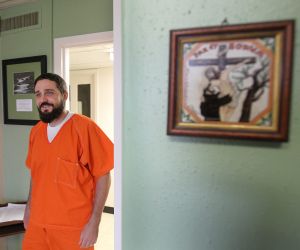Attorney suits up in jailhouse orange for Lent
Posted: Thursday, March 13, 2014 12:01 am
In the 40-day season of self-denial called Lent, some Christians give up daily comforts such as chocolate, soda or Facebook. Attorney Kent McKeever felt called to try something a little more uncomfortable. McKeever, a youth minister and Mission Waco legal advocate, is dressing each day head to toe in orange jailhouse scrubs in solidarity with the imprisoned and returning ex-cons shunned by society. His appearances in public since Lent began last Wednesday have turned some heads.
“On Saturday, I took my daughter to a movie,” he said. “Here I am holding my 6-year-old daughter’s hand walking into the movie. Not many people said anything, but definitely I had glances and questioning looks.”
McKeever is hoping his choice of clothes will kick-start discussions about the failures of the criminal justice and immigration detention systems and the lack of employment opportunities for “returning citizens.”
He said his “Lenten spiritual practice” also has caused him to reflect on the teachings of Jesus about the poor and dispossessed — and his own social privileges as a white professional male.
“I wanted this to be a time for repentance, sacrifice and humility in my own faith, and in a way that will lead many of us to a corporate confession of our complicity with a system that devastates individuals, families and communities, often communities of color,” he said.
McKeever is blogging about his experience at 40daysinorange.wordpress.com, where he critiques the big business of “mass incarceration” and cites studies showing that 65 million American adults have criminal records.
But the main message he wants to convey is that communities should offer second chances to those who already have served time.
“A living wage is so crucial to getting people out of poverty,” he said. “There are a lot of people in the community who can’t get jobs because they have to check this box on an employment application: Have you ever been convicted of a felony? Once you check it, it’s pretty much inevitable that it’s going into this pile, and you’re not going to get a call back.”
McKeever applauds the city of Waco’s recent decision to ease its restrictions on hiring ex-convicts, and he wants to connect with the new McLennan County Reintegration Roundtable, which aims to increase opportunities for that population.
McKeever said not all jobs are appropriate for ex-cons, but employers should make decisions on a case-by-case basis rather than rejecting anyone with a criminal history.
In more than a decade of working with the poor and dispossessed, McKeever has witnessed the frustration of unemployed ex-cons firsthand.
Legal aid
Since 2012, he has served low-income clients as an advocate in areas of civil law such as employment, immigration and landlord-tenant disputes. He pioneered the legal aid position and raised money to make the job a reality.
“We’re trying to get low-income people access to justice in a way that’s efficient and beneficial,” he said.
An Abilene native, McKeever attended Baylor University and volunteered with Mission Waco before graduating in 2001. He worked in various urban ministries and earned a degree from Princeton Theological Seminary before the idea of going to law school even occurred to him.
“I continued to see so many needs in the people I was serving, and so many came back to the need for legal services, justice and advocacy,” he said. “Going back to law school was a natural extension for me.”
McKeever earned a law degree from Vanderbilt University, then moved back to Waco with his wife and three children in 2012. He created the legal advocacy position he holds and for the first year and a half raised all of the money for his salary and operations.
Sheryl Swanton, managing attorney at the Lone Star Legal Aid office in Waco, met with McKeever as he was trying to start his legal aid ministry and encouraged him. Her office offers civil legal services to low-income clients but has to turn most away because of budget concerns.
“I think he’s really trying to help people who wouldn’t even know about us, and whose legal issues aren’t urgent enough for us to take them,” Swanton said. “I feel he really has a heart for helping those people.”
In the meantime, he has worked part time as a youth minister at Seventh and James Baptist Church.
Last year, McKeever attended a lecture by Michelle Alexander, author of “The New Jim Crow: Mass Incarceration in the Age of Color Blindness.” She drove home the point that minority communities are disproportionately affected by the lifelong stigma of incarceration, limiting opportunities for housing, employment and political representation.
That was the inspiration for his Lenten decision.
“As Lent approached, I couldn’t get it off my head and heart,” McKeever said.
He talked about his idea with his spiritual advisers, his bosses at Mission Waco and his wife, Emily.
“I told him just to go for it,” said Emily McKeever, Parents Day Out director at Columbus Avenue Baptist Church. “I knew it would be a bit outside the box and would definitely get people’s attention. . . . I definitely support what he’s doing.”
At a local jail supply store, an employee tried to discourage him from dressing like a prisoner, warning him that it might get him in trouble if he gets pulled over.
Drawing questions
The McKeevers went to San Antonio in the past week for a getaway, and Kent McKeever’s attire drew suspicious glances, whispers and a few outright questions at the Riverwalk and the Alamo.
McKeever said he plans to keep wearing the uni- form until Lent ends on Easter, April 20, with breaks on Sundays, which in Lenten tradition are supposed to be days of celebration.
Jerrod Clark, a social worker who works alongside McKeever at Mission Waco’s Meyer Center on Washington Avenue, said he admires the attorney’s courage.
“I’m a little envious of his ability to step out in faith and put himself in a situation where he has to explain himself,” Clark said. “The spiritual part of that is connecting with folks who are struggling day to day with societal judgment.”
At the Meyer Center on Tuesday, McKeever stood in a hallway in his orange scrubs and canvas shoes talking to a couple of clients who were looking for help with employment. After McKeever explained his aim of standing with the incarcerated, the face of one of the unemployed men lit up.
“That’s awesome!” he said. “I’m so glad you’re doing that.”
Alberto Melis, a former Waco police chief, ran across McKeever while volunteering at the Meyer Center this week.
“When he walked into the room, I had to do a triple take,” Melis said. “It was jarring and incongruous. Out of context, it does make you think.
“As a society, we say we believe prison is for punishment and for rehabilitation. But I don’t think many people really believe in the rehabilitation part. We look at the punishment part and think that it marks them for life. I find that in myself. This is a challenge to me.”
McKeever said it’s a challenge to himself, too.
“God loves these prisoners,” he said. “We should challenge and confront our subconscious stigmatization of this population.”
“On Saturday, I took my daughter to a movie,” he said. “Here I am holding my 6-year-old daughter’s hand walking into the movie. Not many people said anything, but definitely I had glances and questioning looks.”
McKeever is hoping his choice of clothes will kick-start discussions about the failures of the criminal justice and immigration detention systems and the lack of employment opportunities for “returning citizens.”
He said his “Lenten spiritual practice” also has caused him to reflect on the teachings of Jesus about the poor and dispossessed — and his own social privileges as a white professional male.
“I wanted this to be a time for repentance, sacrifice and humility in my own faith, and in a way that will lead many of us to a corporate confession of our complicity with a system that devastates individuals, families and communities, often communities of color,” he said.
McKeever is blogging about his experience at 40daysinorange.wordpress.com, where he critiques the big business of “mass incarceration” and cites studies showing that 65 million American adults have criminal records.
But the main message he wants to convey is that communities should offer second chances to those who already have served time.
“A living wage is so crucial to getting people out of poverty,” he said. “There are a lot of people in the community who can’t get jobs because they have to check this box on an employment application: Have you ever been convicted of a felony? Once you check it, it’s pretty much inevitable that it’s going into this pile, and you’re not going to get a call back.”
McKeever applauds the city of Waco’s recent decision to ease its restrictions on hiring ex-convicts, and he wants to connect with the new McLennan County Reintegration Roundtable, which aims to increase opportunities for that population.
McKeever said not all jobs are appropriate for ex-cons, but employers should make decisions on a case-by-case basis rather than rejecting anyone with a criminal history.
In more than a decade of working with the poor and dispossessed, McKeever has witnessed the frustration of unemployed ex-cons firsthand.
Legal aid
Since 2012, he has served low-income clients as an advocate in areas of civil law such as employment, immigration and landlord-tenant disputes. He pioneered the legal aid position and raised money to make the job a reality.
“We’re trying to get low-income people access to justice in a way that’s efficient and beneficial,” he said.
An Abilene native, McKeever attended Baylor University and volunteered with Mission Waco before graduating in 2001. He worked in various urban ministries and earned a degree from Princeton Theological Seminary before the idea of going to law school even occurred to him.
“I continued to see so many needs in the people I was serving, and so many came back to the need for legal services, justice and advocacy,” he said. “Going back to law school was a natural extension for me.”
McKeever earned a law degree from Vanderbilt University, then moved back to Waco with his wife and three children in 2012. He created the legal advocacy position he holds and for the first year and a half raised all of the money for his salary and operations.
Sheryl Swanton, managing attorney at the Lone Star Legal Aid office in Waco, met with McKeever as he was trying to start his legal aid ministry and encouraged him. Her office offers civil legal services to low-income clients but has to turn most away because of budget concerns.
“I think he’s really trying to help people who wouldn’t even know about us, and whose legal issues aren’t urgent enough for us to take them,” Swanton said. “I feel he really has a heart for helping those people.”
In the meantime, he has worked part time as a youth minister at Seventh and James Baptist Church.
Last year, McKeever attended a lecture by Michelle Alexander, author of “The New Jim Crow: Mass Incarceration in the Age of Color Blindness.” She drove home the point that minority communities are disproportionately affected by the lifelong stigma of incarceration, limiting opportunities for housing, employment and political representation.
That was the inspiration for his Lenten decision.
“As Lent approached, I couldn’t get it off my head and heart,” McKeever said.
He talked about his idea with his spiritual advisers, his bosses at Mission Waco and his wife, Emily.
“I told him just to go for it,” said Emily McKeever, Parents Day Out director at Columbus Avenue Baptist Church. “I knew it would be a bit outside the box and would definitely get people’s attention. . . . I definitely support what he’s doing.”
At a local jail supply store, an employee tried to discourage him from dressing like a prisoner, warning him that it might get him in trouble if he gets pulled over.
Drawing questions
The McKeevers went to San Antonio in the past week for a getaway, and Kent McKeever’s attire drew suspicious glances, whispers and a few outright questions at the Riverwalk and the Alamo.
McKeever said he plans to keep wearing the uni- form until Lent ends on Easter, April 20, with breaks on Sundays, which in Lenten tradition are supposed to be days of celebration.
Jerrod Clark, a social worker who works alongside McKeever at Mission Waco’s Meyer Center on Washington Avenue, said he admires the attorney’s courage.
“I’m a little envious of his ability to step out in faith and put himself in a situation where he has to explain himself,” Clark said. “The spiritual part of that is connecting with folks who are struggling day to day with societal judgment.”
At the Meyer Center on Tuesday, McKeever stood in a hallway in his orange scrubs and canvas shoes talking to a couple of clients who were looking for help with employment. After McKeever explained his aim of standing with the incarcerated, the face of one of the unemployed men lit up.
“That’s awesome!” he said. “I’m so glad you’re doing that.”
Alberto Melis, a former Waco police chief, ran across McKeever while volunteering at the Meyer Center this week.
“When he walked into the room, I had to do a triple take,” Melis said. “It was jarring and incongruous. Out of context, it does make you think.
“As a society, we say we believe prison is for punishment and for rehabilitation. But I don’t think many people really believe in the rehabilitation part. We look at the punishment part and think that it marks them for life. I find that in myself. This is a challenge to me.”
McKeever said it’s a challenge to himself, too.
“God loves these prisoners,” he said. “We should challenge and confront our subconscious stigmatization of this population.”








No comments:
Post a Comment
Thank you for commenting.
Your comment will be held for approval by the blog owner.